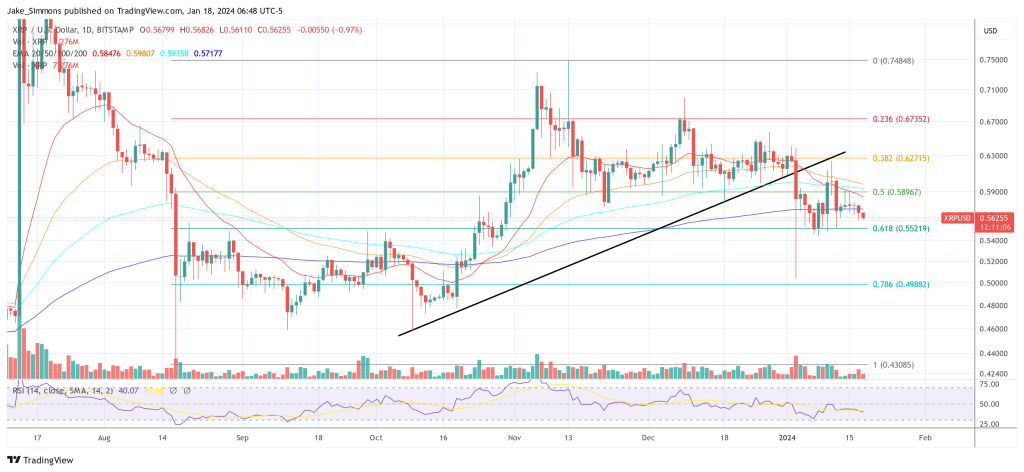While all eyes were on the Coinbase vs. the US Securities and Exchange Commission hearing yesterday, there was another major court case that, while not directly affecting crypto, could indirectly have a massive impact on the industry and companies like Ripple and Coinbase.
The case in question is Loper Bright Enterprises vs. Raimondo before the United States Supreme Court, involving the Chevron doctrine. The petitioners are a group of herring fishermen from New Jersey challenging the National Marine Fisheries Service’s interpretation of the Magnuson-Stevens Act. The case questions the scope of the Chevron deference doctrine and its application by the United States Court of Appeals.
The latter has profound implications for the regulatory framework encompassing cryptocurrencies and crypto firms like Ripple. The Chevron doctrine, a cornerstone of administrative law since the 1984 Chevron U.S.A., Inc. v. Natural Resources Defense Council, Inc. case, essentially enables agencies to interpret ambiguous statutes within their purview, granting them substantial interpretive authority, provided their interpretations are “reasonable.”
Chevron Doctrine’s Relevance In Crypto Regulation
Fox Business journalist Eleanor Terrett underscored the doctrine’s significance for the crypto sector, stating, “The potential overturning of the Chevron doctrine in the Supreme Court could have far-reaching implications for the crypto industry as conservative judges weigh scaling back the regulatory power of federal agencies.”
Khurram Dara of Bain Capital Crypto pointed out the relevance of cryptocurrencies as a prime example of modern regulatory challenges. He highlighted that lawyer Paul Clement brought cryptocurrencies into the spotlight of the US Supreme Court yesterday.
Clement cited crypto as a “concrete example” of the problems with Chevron:
What I am saying Chevron is a big factor contributing. I would think the uniquely 21st-century phenomena of cryptocurrency would have been addressed by Congress. I certainly would’ve thought that would’ve been true in the wake of the FTX debacle. It hasn’t.
Why? Because there is an agency head out there who thinks he already has the authority to address this uniquely 21st-century problem with a couple of statutes passed in the 1930s.
Michael Passalacqua, representing Willkie Farr & Gallagher LLP, delved into the Chevron doctrine’s implications for the crypto space and companies like Ripple and Coinbase. A recalibration or limitation of the doctrine could significantly curtail the interpretive leverage exercised by agencies like the SEC, often accused of stretching statutory provisions to exert regulatory control over novel sectors like crypto.
“Importantly Chevron deference applies in the context of statutory interpretations & not case law (e.g., Howey). So don’t expect SCOTUS overturning Chevron to hinder the SEC’s crusade against cryptos offered & sold as ICs. […] That said, if Chevron is overturned, then this should chill agencies’ efforts to regulate industries where there is not a clear statutory mandate (e.g., crypto),” Passalacqua analyzed.
SCOTUS oral arguments are scheduled for today in the case of Loper Bright Enterprises v. Raimondo
The outcome of this case could affect how the crypto industry is regulated in the near term.
My first thread
(be kind, anons)
— anoncounsel (@anoncounsel) January 17, 2024
Ripple, XRP, And The Chevron Parallel
The discourse holds particular significance for Ripple and the XRP community. Ripple’s fight against the US SEC could dramatically change. Cory Johnson once stated: “Ripple’s relationship to XRP is akin Chevron’s relationship to oil. We have a lot of it, we believe it’s a superior technology and we support its many uses — for billions of reasons. But we don’t have all of it, we don’t control it and we aren’t it.”
In other words, the XRP community argues that Ripple is like Chevron: “Does Chevron sell oil for a profit to fund their business? Did Chevron create oil? No. Did Ripple labs create XRP? No.” Notably, Ripple Labs was created after the creation of XRP and was gifted.
Supreme Court’s Stance And Implications
The Supreme Court’s inclination, as reported by Scotus Blog, suggests a readiness to redefine or significantly limit the Chevron doctrine. This inclination resonates across the federal spectrum, where agencies have traditionally relied on the doctrine to interpret and implement federal laws, especially in technologically advanced and dynamically evolving sectors like cryptocurrency.
In conclusion, the Supreme Court’s re-evaluation of the Chevron doctrine holds the potential to dramatically alter the regulatory landscape for cryptocurrencies. Ripple, Coinbase, and other US-based crypto firms are certainly watching closely.
At press time, XRP traded at $0.56255.











